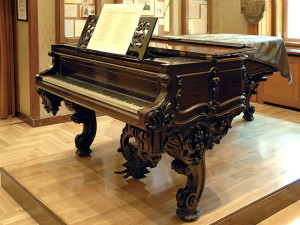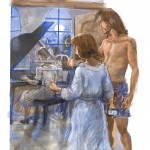Abba was fanning himself with the folded front section of Ma’ariv when the bell buzzed. Ema was making her way through the kitchen door with a transparent tumbler of tea and nana, held on a waxy serviette, stirring up settled sugar. Abba looked up at her. Ema reached the couch, placed the serviette on the glass top of the coffee table, gently settled her tumbler on the serviette, and seated herself, with dignity, on the settee. She picked up the weekend supplement and considered the table of contents. The doorbell, whose chime had long since deteriorated into a scratchy drone, sounded again, much longer.

He turned his gaze to me, sitting on the cool patterned tiles with my Ditza.
“Is someone going to get the door?” he asked, directing his words into the high-ceilinged vacuum, the drop of sweat falling from his cheek and just missing the strap of his white singlet to hit a tuft of hairs on his bony shoulder.
Ema finished reading a sentence, smiled, and slowly, with poise, directed her eyes at her husband.
“Well, you certainly don’t expect the girl to do it,” she said acidly.
“No, I certainly don’t expect the girl to do it,” Abba replied, mimicking her voice.
“I’m busy,” I announced, and I was, as my doll was demanding my attention and comfort, and to stand up would be to leave the thin layer of temperate air that lined the floor and enter the stifling inversion above it.
“I’m not dressed,” Abba said, pulling at the damp stain of undergarment sagging at his sternum.
“I wonder,” Ema mused, returning to the article she had begun reading, “who could be calling at noon on a July Saturday, when no decent soul goes outside for the heat. And why haven’t Omri and Nimrod come home yet?” Omri and Nimrod, my fusty teenage brothers, had gone to commit fouls against Arab kids in the Kidron Valley. It was the most audacious place to play football since the war ended and the no-man’s land could serve as a pitch.
The buzz sounded insistently. I saw a face peek through the window by the door.
“She knows we’re here,” I observed.
Abba glared at Ema, pushed himself up from his chair with sinewy forearms, brushed biscuit crumbs off his boxer shorts, and shouted “Daka! Daka!” Marching to the bedroom that opened off the salon, he emerged a few seconds later with a white shirt slung over his shoulder, pulling on the pants of one of his three black suits. He donned the shirt, buttoned it with swift expertise, tucked the tails into his pants, zipped up his fly, buckled his patent-leather belt, and strode toward the door.
“You’re barefoot,” Ema said, still reading her article. He glared at her, returned to the bedroom. The doorbell buzzed again and the mattress on the double bed creaked. He emerged fully dressed and headed for the door.
When the door opened, we were presented with a woman too old to be a mother wearing a tapered sky-blue suit with a skirt reaching below the knee. Her shoes were stern and proper ones with firm heels and her hair was too-perfectly copper. She had been pressing the bell button with a finger clad in white cotton glove.
Ema covered her mouth with both hands, for she knew who this woman was before we even heard the voice speak its English words with a Levantine-tinged British accent.
“An Arab!” Ema whispered.
“Yes?” Abba asked, confused, as he had been expecting a neighbor or perhaps the concerned mother of one of the members of the boys’ gang.
The woman extended her hand. “Good afternoon,” she said. It sounded as if she had practiced the scene many times before arriving. “I am Violet Khouri and this is my home.”
Abba and Ema reacted as if they saw, behind the visitor, three witches, five wraiths, and a host of goblins. I couldn’t decipher the looks on their faces at the time, but I soon learned that they had been having nightmares about this very scene ever since June 9, when they heard Mordechai Gur, amidst the static of the radio and the racket of war, announce that the Temple Mount was ours. The barriers fell in short order and Jews streamed into the Old City and East Jerusalem and Arabs began, hesitantly at first, walking over to the Israeli side to watch the traffic light at Jaffa and King George and inspect the wares in downtown stores.
“It is not,” Ema said, rising and approaching the intruder with measured steps. “We paid good money for it.”
“We have all the documents,” Abba said defensively. “It’s all perfectly legal.”
“I do not expect you to return my home to me,” the visitor said, carefully enunciating each word, dampness apparent on her carefully made-up face. “However, I ask permission to see it. Furthermore, I have come to inquire about the piano I left here when we had to evacuate in the last war but one.”
“I had a piano as well, in the home I had to leave,” Ema said with a politely frozen smile.
Abba moved to close the door, but the visitor did not flinch. He sighed. “You understand that by letting you in we are in no way acknowledging any claim of yours to this property or anything in it.”
“You’re letting her in!” Ema gasped.
Abba shrugged. “Didn’t we go to see your house in Frankfurt?”
Ema was truly shocked. “How can you compare us to them!”
“I promise it will not take long.” The visitor gazed at me. “What a beautiful little girl!” She fumbled in her purse. A small Cadbury bar appeared against the background of her white glove on her left hand, held out to me. I rose and took it.
“Karin!” Ema hissed.
“She is a quiet one, like my oldest niece,” the visitor observed to Abba and Ema. Then she turned to me again. “Perhaps you would like to show me your room?”
“Sure,” I said, taking her by the hand that had offered the chocolate. I led her down the hall. “That’s where Omri and Nimrod live,” I said, pointing to a closed door on the left on which a real parachute had been hung. “You don’t want to go in there. Here’s my room.”
The visitor took in the lace curtains Aunt Dorothea had sent from London and the flowered wallpaper. “Are you ever lonely?” she asked. “I slept with my sister Flora here in the same bed.”
“I’d like to have a baby here, in a crib, by the wall,” I said. “But Ema and Abba don’t want one.”
In the doorway, Ema exclaimed: “Karin!” Behind her, Abba was wiping his face with a blue-bordered handkerchief.
“The piano,” the visitor said. Her voice, so carefully measured up until now, missed a beat. “Is it still—in the music room?”
“Ema calls it the guest room,” I said, taking her hand again and leading her across the corridor. “I’m the only girl in class who has a guest room.” I paused to unwrap the chocolate bar before we passed under the archway.
The piano stood in the center of the room. A vase with a single rose stood on a white doily on the top of its polished and closed lid. The visitor stood for a moment and gazed at it, then walked slowly around it, counter-clockwise, ending at the keyboard. She lifted her skirt and sat down. The corners of her mouth turned down when she saw the music above the keys. “Liszt.” She shuddered and looked at Ema. “May I?” she said.
Ema was about to say something but Abba cut her off. “We had it tuned just last week,” he said.
The visitor played an arpeggio and smiled at the sound. Then she played a few measures of a piece, slow and wistful, and rose.
“Thank you very much,” she said to Ema and Abba. She smoothed out her skirt. “I will not disturb you any longer.”
Abba stepped back and held out his arm toward the door.
“It’s been a—surprise,” he said.
At the door, the visitor held out her right hand and Abba and Ema slowly raised theirs to shake it.
“Excuse me,” the visitor said. “One more thing.” She opened her purse and drew out a small enameled case. She hinged open its lid and removed a card. “Please,” she said. “I am a teacher. Perhaps the little girl …?”
“Oh, she won’t go near it,” Ema said. “We’ve tried and tried.”
“I would,” I said. “With her, I would.”
Ema slapped my wrist.
“You’ll find my rates quite reasonable,” the visitor said. Then she kneeled down to look me in the eye. “You can call me Miss Violet,” she said.
“When will you come back?” I asked.
Miss Violet rose and looked questioningly at Abba and Ema. “Would Tuesday at four in the afternoon be convenient?”
“Well, I suppose,” said Abba, looking uncomfortably at Ema, who cut in icily with “I think we will need to discuss this between us first.”
“Tuesday is great,” I said, popping the last bit of chocolate in my mouth. “Omri and Nimrod will be at their youth movement and they won’t bother us.”
“You must let your parents decide,” Miss Violet beamed at me.
“Oh, they do whatever I want,” I said.
Miss Violet laughed. “Do they really?”
“You were just leaving?” Ema asked.
“It is not a problem,” Miss Violet said. “I have done it before.” And she turned and descended the stairs to the garden.
Abba and Ema stood in silence for a moment.
“Well,” Abba said. “I think I’ll change out of my suit.”
Ema looked at me. “You’ll have to practice. Half an hour every day.”
I nodded and went back to my doll.
“Did you hear,” she called out to Abba, who was in their room changing, “how she said ‘Lizst?’” There was no reply. She sat down on the couch, caught sight of her glass, sighed, and got up to make more tea.
^^^^^^^^^^^^^^^^^^^^^^^^^^^^^^^^^^^^^^^^^^^^^^^^^^^^^^^^^^^^^^^^^^^^^^^^^^^
More on Miss Violet:
 Miss Violet’s Piano (on SoJo)
Miss Violet’s Piano (on SoJo)
Fiction: In an old Arab house, a piano teacher returns.
More Necessary Stories!






Lovely, interesting story and so beauutifullywritten!!!
Complimentsdear Haim!!!!